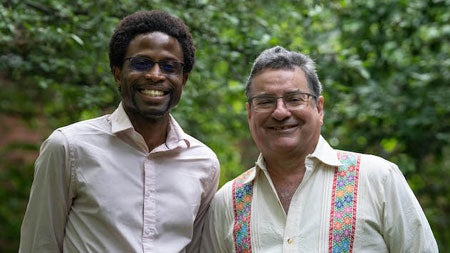
Ukpong B. Eyo, PhD, (left) and Edward Perez-Reyes, PhD, have advanced our understanding of how the brain responds to seizures
New School of Medicine findings about how the brain responds to seizures could facilitate the development of much-needed treatments for the third of patients who don’t respond to existing options.
The research, from the labs of UVA’s Ukpong B. Eyo, PhD, and Edward Perez-Reyes, PhD, suggests that immune cells called microglia play important, beneficial roles in controlling various types of seizures. Prior research had left scientists uncertain whether these cells were helpful or harmful during the brain’s seizure response, so UVA’s new discovery offers useful direction for researchers developing new treatments.
“Over the years, there has been debate as to the precise roles of microglia in seizure disorders, and the availability of precise tools to specifically target microglia without affecting other aspects of the brain has been lacking until the approach we have employed in this study,” said Eyo, of UVA’s Department of Neuroscience and Center for Brain Immunology and Glia (BIG Center), as well as the UVA Brain Institute. Our study examined microglial contributions in different models of seizures. [The results] suggest that broadly enhancing microglial activity in patients with different seizure origins could be a promising approach.”
Read full press release in the UVA Health Newsroom.
